You’re a family caregiver with little to no help from others. You’re feeling overwhelmed and exhausted. You feel like nobody cares and you’re alone with too much to do. There’s help and here’s how you find it.
All the signs were there: strange purchases, neglected house, lost items, sitting in the dark watching a blank television screen, unable to answer simple questions, and the list goes on. You couldn’t make sense of it and there’s no one to help. You took your senior loved one to the doctor and the diagnosis came—a condition in which your loved one can no longer be left alone, such as dementia or Alzheimer’s.
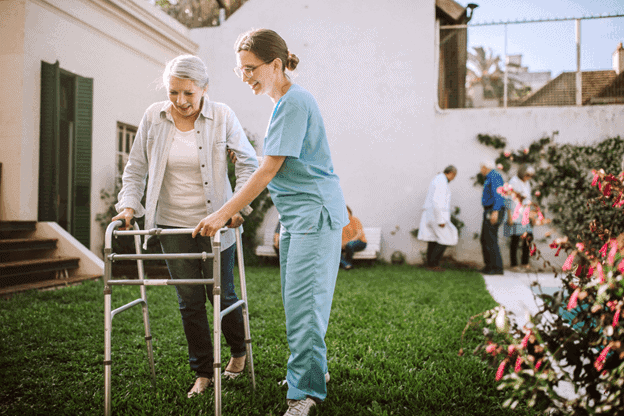
You know your loved one needs help and so you do it. You have now become the primary family caregiver and you’re worn out. Your loved one is getting help and it’s you! And now the one who needs help is you! It’s a common story and you’re not alone. Many family members provide caregiving services to close family members.
The biggest challenge for family caregivers is staying healthy. When a loved one becomes incapacitated physically or mentally and needs home help, the brave one in the family generally steps up. After a little time, it quickly becomes clear that the job is exhausting and overwhelming. When the helper needs help, she or he suddenly realizes that the rest of the family may be difficult to find.
It’s not surprising that family caregivers are desperate for help as their own health condition begins to decline. According to the Family Caregiver Alliance, “studies have consistently reported higher levels of stress, anxiety, depression and other mental health issues among [family caregivers].” To prevent yourself from further loss, a health care aide may be just what you need.
COVID Safety Concerns
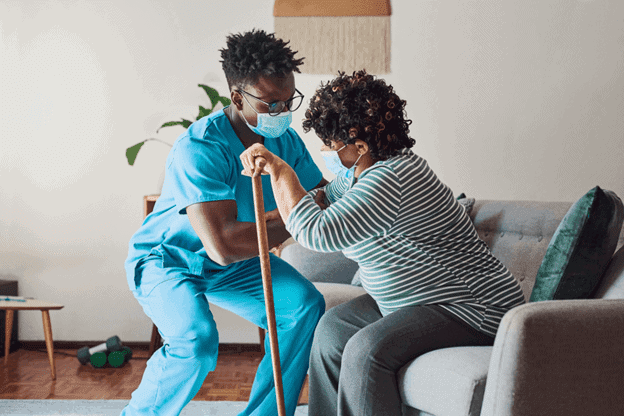
The COVID-19 pandemic exposed the geriatric health care system as negligent. Nursing homes and large assisted living facilities were found to be unprepared for the onslaught of the viral attacks on the frail senior population. In a report by the CDC, “8 out of 10 deaths were seen in people aged more than 65 years in the United States.”
One positive thought that can be taken away from the COVID-19 experience is that geriatric health care policies are improving. President Biden’s American Rescue Plan proposal includes provision to discuss the long standing issues that have hindered the elderly care industry from much needed reforms.
So, is it safe to get a health care aide while the threat of COVID still lingers and before the reforms take place? Yes it is. The CDC has gone through great lengths to vaccinate and educate the population with particular attention to senior care services. Most health care aides receive COVID-19 training as part of infection control efforts. When looking for the best possible aide, choose a health care aide that’s also trained in infection control.
A Health Care Aide Can Save Your Sanity
Although it’s customary to think of health care aides as someone who gives assistance to the elderly, when you hire one you quickly find they are a saving grace for your sanity. But saving your sanity shouldn’t come at the emotional and physical expense of your loved one. Choosing a home care aide may be a great choice for you, your family and your loved one.

Health care aides are also known as Patient Care Assistants, Personal Care Aides, Caregivers, and Resident Care Assistants to name a few. They are trained and experienced to assist people with chronic illnesses or disabilities with their daily living activities. A Caregiver’s schedule is set by their agency. They work in many types of environments such as nursing homes, assisted living facilities, adult day cares, and as private home care aides.
Examples of the duties that a health care aide might perform are:
· Bathing
· Grooming
· Toileting
· Eating
· Meal preparation
· Medication reminders
· Socializing and recreation
· Walking and transferring from one spot to another
· Change wound dressings
·.
3 Types of Working Environments for Health Care Aides
Let’s examine three main types of health care aide environments, their benefits and risks, to determine which may be the right fit for you and your loved one.
Assisted Living Community Care Aide
The assisted living community is a senior housing facility with many residents with up to 100 or more beds. These large communities can offer several engaging services to their residents. It may be well worth the expense if the resident is able to utilize all the extra services, such as a gym. However, most elderly do not prefer to engage in the activities offered in these spacious amenities. The large corporations such as these cater mostly to what their adult children think they want , not what is necessarily reasonable for their loved one, as they age.
Simply put, many older seniors are no longer able to use an exercise gym or other services that require more muscle strength and movement than necessary. Nor do most want to participate in activities where the groups are too large.
Benefits of Assisted Living Community
Residents who are able to engage in the facility’s full-range of services can benefit from a large communal environment. Some benefits include:
· meeting new faces
·.
·(if offered)
· eating meals in dining halls
· pampering in the salon (if offered)
· taking medication administered by staff
If your loved one enjoys getting out and meeting new people and exploring new spaces, this may be the choice for your lively loved one.
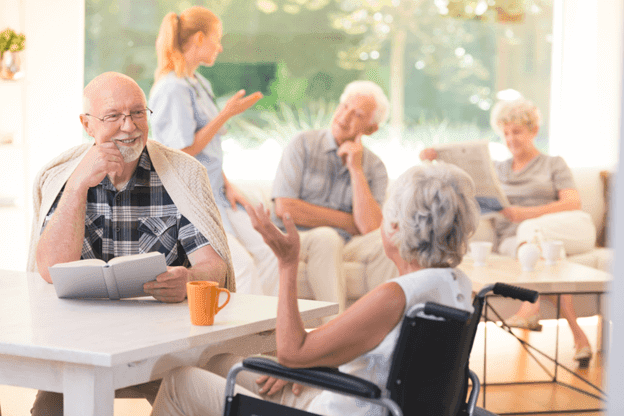
Risks of Assisted Living Community
As wonderful as it may sound, the communal living environment has its risks. Below are some risks to keep in mind.
1. The CDC continues to recommend distancing which is virtually impossible in a large community setting.
2. The CDC recommends a newly admitted resident to be quarantined. This may be too emotionally difficult for seniors moving into a new place.
3. Residents with Alzheimer’s or dementia may find it difficult to adjust to unfamiliar surroundings and try to leave or walk out.
4. Staffing shortages often put residents in danger of neglect or abuse.
5. Facility staff is often too busy to show compassion or gentleness.
6. Staffing shortages often result in unclean rooms and unsanitary conditions.
7. Residents may be evicted without notice.
8. Typically, there is little to no bonding between health care aides and residents.
Putting your loved one in a facility may seem easier because you fully trust the facility to take good care of your loved one 24/7. But without being vigilant, your loved one may not be getting the care you think they are.
In-Home Care Aide
An in-home care aide is a health care aide that works in your loved one’s home. They are non-medically licensed care professionals who assist with everyday living activities. Home health aides work through an agency or are independent. Their schedules are set by their employer or themselves. They are a great alternative if you want your loved one at home with you and don’t require extensive medical services outside of a hospital setting.
In-home care aides are highly suitable for you if your loved one needs assistance with:
· Hygiene: bathing, grooming, toileting
· Nutrition: eating and meal preparations
·: games, walks, enrichment outings
· Transport: doctors’ appointments, grocery shopping, salons
· Medical: wound changing/dressing; minor needs
Seniors typically preferred to age at home. Home is a place of familiarity, safety, comfort and security. The geriatric care industry has long recommended aging-at-home as long as possible to be the best care alternative. Hiring in-home care services have some of the following benefits:
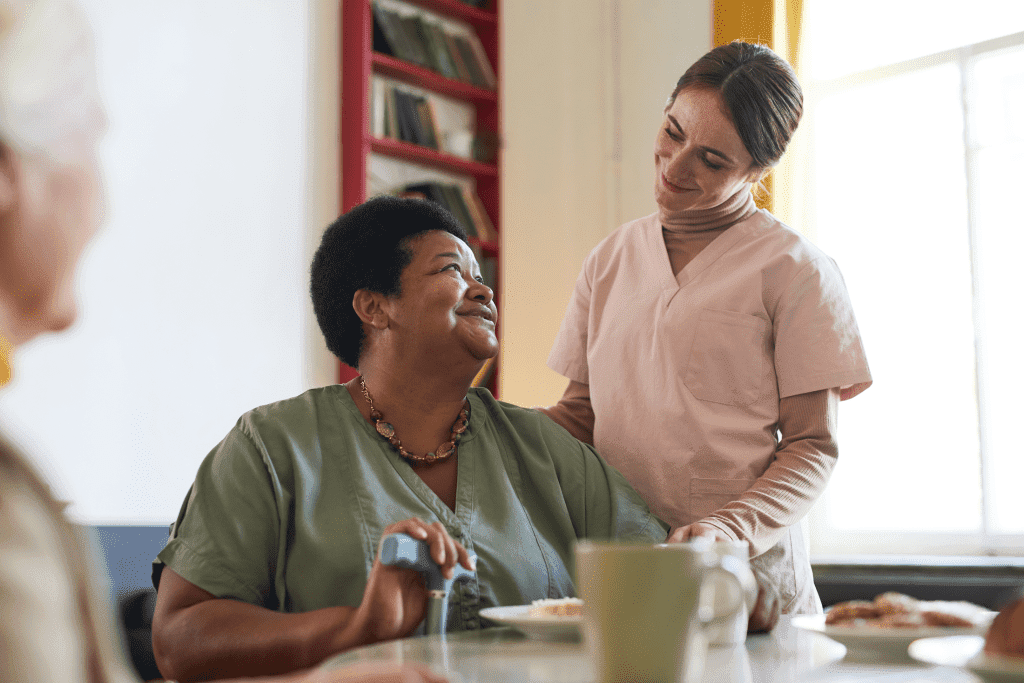
Benefits
· family dynamics are less disrupted
· consistency with health care aide builds trust
· bonding time/companionship develops a friendship attitude
· familiarity with space and possessions
· on-going caregiver availability (if through caregiving agencies)
· caregivers are bonded (if through caregiving agencies)
Although the risks are minimal, below are some risk factors you should consider before hiring in-home care aides:
Risks
1. Hiring from a non-accredited agency may result in abuse and exploitation.
2. More than one home care aide assigned can create confusion in communication.
3. Caregivers may not be punctual.
4. An independent in-home care aide may not be bonded.
Note: There are additional risks involved if you plan to become a caregiver employer by hiring an independent health care aide yourself.
As the employer, you will have to comply with state and federal regulations regarding wages, benefits, and work hours. You will also need to check background and credit history as it relates to the job. It’s also wise to request copies of credentials such as training certificates and assurance that the individual is bonded should theft occur. If your health care aide doesn’t show up for work, it’s up to you to find a quality replacement. You can hire your own aide. But, in the long run it may prove to be added stress you didn’t count on.
The Best of Both Worlds—The Home-Style Assisted Living House
The home-style assisted living house mixes the best of assisted living and the personal home environment. These houses follow the same health and safety protocols as assisted living facilities without the impersonal atmosphere between residents and staff. In addition, extracurricular activities are not offered for seniors who no longer are able nor interested in those activities.
It’s a different concept in that the house is specifically structured to accommodate seniors living in a home environment within a middle-class residential community. It is virtually indistinguishable from the surrounding residential homes. There are 2-3 senior residents living at the house at a time. Health care aides are able to give full, loving attention to each resident and build strong bonds. It’s like having a second family in a second home.
Your loved one is a perfect candidate for a home-style assisted living house if you want a small home setting for them; worry-free, 24 hour care; and, freedom to focus on your job, spouse and children.
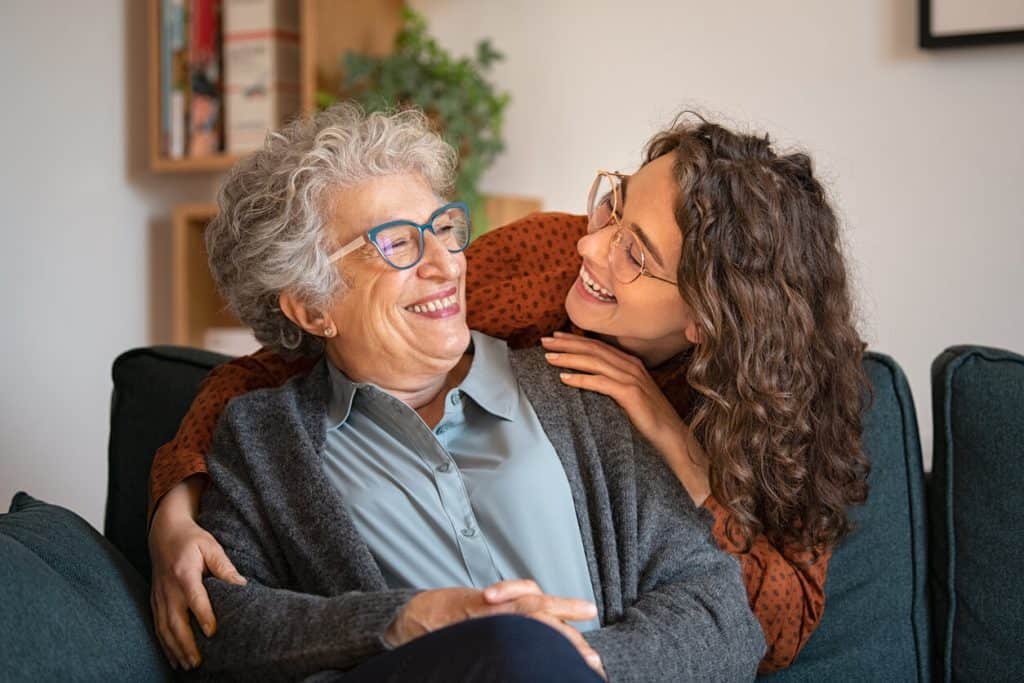
You and your loved one will enjoy the following benefits from the home-style assisted living house:
Benefits
· Small resident count (2-3 maximum residents)
· Compassionate care 24 hours a day, 7 days a week
· Family style living with other residents
· Strong bonding opportunity for your loved one and health care aide
· Residents develop friendships with their peers
· No fear of your loved one walking off the grounds
· Small intimate settings for games and enrichment programs
· Individualized attention to each resident
· Residents are happier with constant attention and compassionate care
·; however, the risks in the home-style assisted living house may be more emotional due to the closeness and bonding that can develop between peers and health care aides. Some risk factors to consider are:
Risks
1. Residents and family members may experience sadness if a caregiver moves away.
2. Residents may experience sadness or depression when fellow residents with whom they have formed a close bond are gone.
3. The house may not be conveniently located to the family.
These home-style assisted living houses approach elder care as a partnership. They work with the seniors to combat those feelings of helplessness, loneliness, and boredom in a caring and compassionate way while attending to their physical needs. It very much has a family-feel but better.
Are Health Care Aides Affordable?
Fees can greatly vary depending on the health care aide’s employment status and location. There are many factors that can go into the costs of a health care aide. But perhaps the most important affordability question doesn’t deal with fees at all.
The real question that needs to be asked is, “can you afford not to have a health care aide helping you with your loved one?” Based on the studies that measure family caregiver burnout, anxiety, stress and depression, the answer is no. For the sake of your physical and mental health, you should not try to be a family caregiver alone.
Conclusion
It’s well known that caring for a senior loved one is physically and emotionally demanding. The requirements are challenging to say the least. There are options available to help you. Health care aides are a staple in the healthcare industry. For family caregivers, they serve as a much needed hiatus when you need to revive and restore your sanity.
If you don’t want to place your loved one in a large assisted living facility but you need help, then in-home care services or a home-style assisted living house may be just what you’re looking for.
Please contact your local home care providers who can help you find the best health care aide. Learn more today!
At Amy’s Eden, we can address all of your concerns. Whether your loved one requires a special menu, has language or communication issues, mobility issues, or simply needs a program that keeps them socially engaged, your search is over. Your loved one becomes our top priority so you can focus on continuing life: jobs, education, family responsibilities, but with complete confidence that you are taking care of your loved one in the best way possible.




